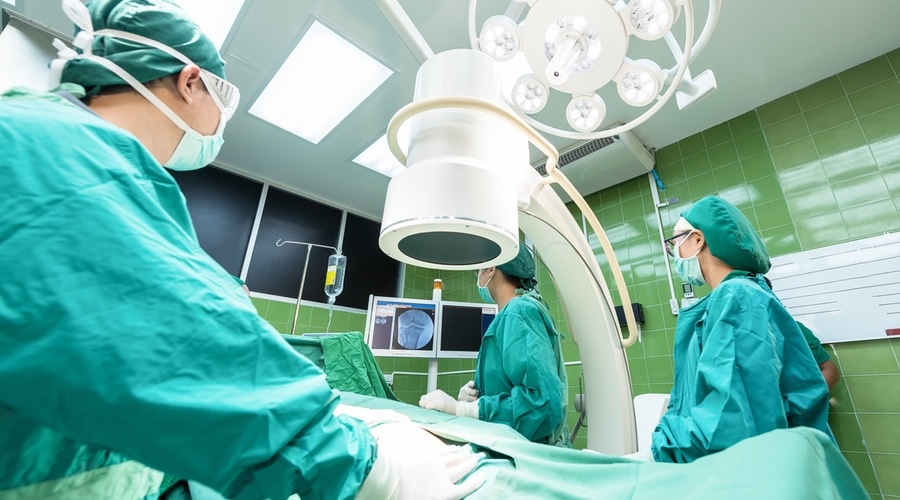Proximie’s AR tool delivers healthcare to war zones

The idea came about during a 2012 mission to El Salvador.
As a volunteer with the Global Smile Foundation, Boston-based Lebanese entrepreneur Talal Ali Ahmad observed obstacles doctors in remote areas faced when trying to give patients the best care possible.
After spending a career in mobile phone development, he wanted a new and more meaningful challenge.
“At the time, the medical field was going through transition. I thought I could add value there,” said Ali Ahmad. He recalled someone asking during his mission: “Is there something we can do [to make healthcare better]?”
He began developing a device that allowed doctors to guide their peers remotely, through screens and software. As he continued to refine it, the technology became increasingly basic and easy to use.
“The beauty of it is in the simplicity,” said Beirut-based surgeon Ghassan Abu-Sittah, who leads a conflict medicine program at the American University of Beirut Medical Center. Abu-Sittah has been using Proximie from the beginning of its development.
Three years later, he and his cofounder Nadine Haram, a Lebanese surgeon based in the UK, are leading a global community of doctors guiding colleagues through complex surgeries through a webcam, video and a basic Internet connection.
From screen to operating table
“[Augmented reality] is much more intuitive and interactive than traditional simulation or live streaming tools. You can literally add layers to what someone sees using digitally generated content,” said Haram.
Through the augmented reality platform, surgeons like Haram guide the local team in the operating theatre through marking annotations on a screen, placing their hands in the surgical field, and integrating the patients’ records.
The simple interface allows doctors to navigate the platform with just a few days of training.
“What attracts us to this is that the challenges facing public healthcare are hugely complex, yet the solutions offered by technology are beautifully simple. This idea of bringing forms of surgery to places where they haven’t been available before with nothing more than an internet connection and mobile devices seems very powerful to us,” says Haram.

“We like to think of it in terms of a creating a global, democratized surgical community, where practitioners can crowd source the knowledge they need to meet whatever demands they face on the ground,” she said
Proximie, previously Vitaax, is backed by the Lebanese VC firm Cedar Mundi Holdings.
Reaching conflict areas
The company began its initial trials working with the Global Smile Foundation in rural Latin America two years ago, with surgeons in the United States remotely guiding those in Peru and El Salvador. The remote guidance helped them repair the cleft palates of children in coordination with Boston-based surgeon Usama Hamdan.
The following year, through Proximie, surgeons in Gaza, Syria and Iraq coordinated with colleagues in Beirut for nearly 10 trauma wound surgeries.
The surgeries marked the beginning of the platform’s work in conflict medicine - a growing field in the Middle East and North Africa, and one that will likely require more guidance by highly skilled surgeons to remote, violent and understaffed areas that often lack basic medical resources.
It is estimated that by 2030, 1.27 million additional surgical providers will need to be trained, which, of course, presents some enormous logistical and financial challenges.
In many cases, doctors in remote areas, particularly in conflict zones, aren’t able to physically connect with doctors elsewhere.
The doctor in Gaza, who has been given instructions by colleagues in Beirut, has been unable to leave the strip since the 2014 war. Through Proximie, he has been able to get the guidance he needs to do new complex procedures, such as facial and limb reconstructions.
Proximie continues to add doctors through their affiliated institutions – hospitals, medical schools and NGOs. It is now being used by University College London, the Royal Free Hospital, London, the University of California at Riverside, and the American University of Beirut.
Although nothing can replace face-to-face interaction, doctors who use Proximie say this is the next best thing when access is impossible.
“We want to make it easier to bring surgical expertise to the two thirds of the world’s population who do not have good access to it,” says Haram.
“We also feel we offer a perfect solution to cash-strapped healthcare systems around the world, because what we offer is low cost, low maintenance, extremely scalable and effective,” she said.
Feature image via Pexels.


